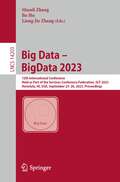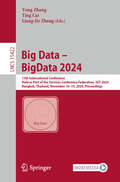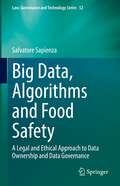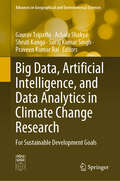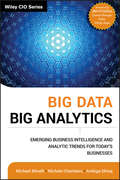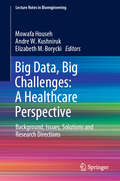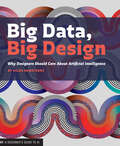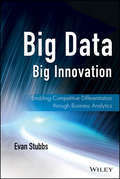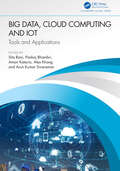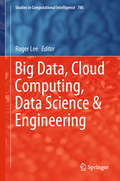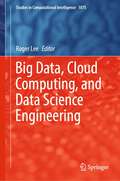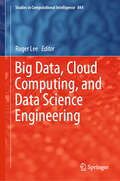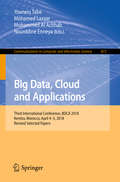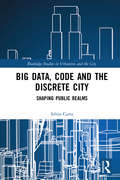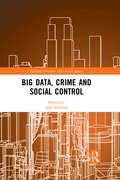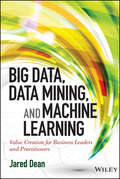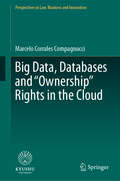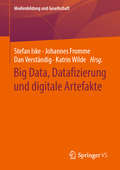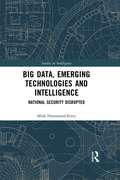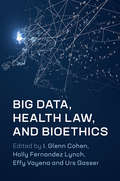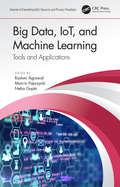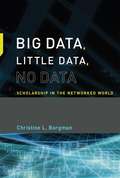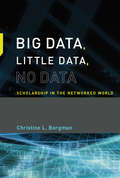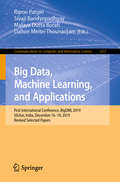- Table View
- List View
Big Data – BigData 2023: 12th International Conference, Held as Part of the Services Conference Federation, SCF 2023, Honolulu, HI, USA, September 23–26, 2023, Proceedings (Lecture Notes in Computer Science #14203)
by Bo Hu Liang-Jie Zhang Shunli ZhangThis book constitutes the refereed proceedings of the 12th International Conference, BigData 2023, Held as Part of the Services Conference Federation, SCF 2023, Honolulu, HI, USA, during September 23–26, 2023. The 14 full papers presented together with 2 short papers were carefully reviewed and selected from 27 submissions. The conference focuses on research track and application track.
Big Data – BigData 2024: 13th International Conference, Held as Part of the Services Conference Federation, SCF 2024, Bangkok, Thailand, November 16-19, 2024, Proceedings (Lecture Notes in Computer Science #15422)
by Yong Zhang Liang-Jie Zhang Ting CaiThis book constitutes the refereed proceedings of the 13th International Conference on Big Data, BigData 2024, held as part of the Services Conference Federation, SCF 2024, in Bangkok, Thailand, during November 16-19, 2024. The 8 full papers and 1 short paper included in this book were carefully reviewed and selected from 21 submissions. They focus on various topics within the field of Data-based services such as Big Data Architecture, Big Data Modeling, Big Data As A Service, Big Data for Vertical Industries (Government, Healthcare, etc.), Big Data Analytics, Big Data Toolkits, Big Data Open Platforms, Economic Analysis, Big Data for Enterprise Transformation, Big Data in Business Performance Management, Big Data for Business Model Innovations and Analytics, Big Data in Enterprise Management Models and Practices, Big Data in Government Management Models and Practices, and Big Data in Smart Planet Solutions. The papers have been organized under the following topical sections: Research track; Application track; and Short paper track.
Big Data, Algorithms and Food Safety: A Legal and Ethical Approach to Data Ownership and Data Governance (Law, Governance and Technology Series #52)
by Salvatore SapienzaThis book identifies the principles that should be applied when processing Big Data in the context of food safety risk assessments. Food safety is a critical goal in the protection of individuals’ right to health and the flourishing of the food and feed market. Big Data is fostering new applications capable of enhancing the accuracy of food safety risk assessments. An extraordinary amount of information is analysed to detect the existence or predict the likelihood of future risks, also by means of machine learning algorithms. Big Data and novel analysis techniques are topics of growing interest for food safety agencies, including the European Food Safety Authority (EFSA). This wealth of information brings with it both opportunities and risks concerning the extraction of meaningful inferences from data. However, conflicting interests and tensions among the parties involved are hindering efforts to find shared methods for steering the processing of Big Data in a sound, transparent and trustworthy way. While consumers call for more transparency, food business operators tend to be reluctant to share informational assets. This has resulted in a considerable lack of trust in the EU food safety system. A recent legislative reform, supported by new legal cases, aims to restore confidence in the risk analysis system by reshaping the meaning of data ownership in this domain. While this regulatory approach is being established, breakthrough analytics techniques are encouraging thinking about the next steps in managing food safety data in the age of machine learning.The book focuses on two core topics – data ownership and data governance – by evaluating how the regulatory framework addresses the challenges raised by Big Data and its analysis in an applied, significant, and overlooked domain. To do so, it adopts an interdisciplinary approach that considers both the technological advances and the policy tools adopted in the European Union, while also assuming an ethical perspective when exploring potential solutions. The conclusion puts forward a proposal: an ethical blueprint for identifying the principles – Security, Accountability, Fairness, Explainability, Transparency and Privacy – to be observed when processing Big Data for food safety purposes, including by means of machine learning. Possible implementations are then discussed, also in connection with two recent legislative proposals, namely the Data Governance Act and the Artificial Intelligence Act.
Big Data, Artificial Intelligence, and Data Analytics in Climate Change Research: For Sustainable Development Goals (Advances in Geographical and Environmental Sciences)
by Praveen Kumar Rai Shruti Kanga Suraj Kumar Singh Gaurav Tripathi Achala ShakyaThis book explores the potential of big data, artificial intelligence (AI), and data analytics to address climate change and achieve the Sustainable Development Goals (SDGs). Furthermore, the book covers a wide range of related topics, including climate change data sources, big data analytics techniques, remote sensing, renewable energy, open data, public–private partnerships, ethical and legal issues, and case studies of successful applications. The book also discusses the challenges and opportunities presented by these technologies and provides insights into future research directions.In order to address climate change and achieve the SDGs, it is crucial to understand the complex interplay between climate and environmental factors. The use of big data, AI, and data analytics can play a vital role in this effort by providing the means to collect, process, and analyze vast amounts of environmental data. This book is an essential resource for researchers, policymakers, and practitioners interested in leveraging these technologies to tackle the pressing challenge of climate change and achieve the SDGs.
Big Data, Big Analytics
by Michael Minelli Michele Chambers Ambiga DhirajUnique prospective on the big data analytics phenomenon for both business and IT professionalsThe availability of Big Data, low-cost commodity hardware and new information management and analytics software has produced a unique moment in the history of business. The convergence of these trends means that we have the capabilities required to analyze astonishing data sets quickly and cost-effectively for the first time in history. These capabilities are neither theoretical nor trivial. They represent a genuine leap forward and a clear opportunity to realize enormous gains in terms of efficiency, productivity, revenue and profitability.The Age of Big Data is here, and these are truly revolutionary times. This timely book looks at cutting-edge companies supporting an exciting new generation of business analytics.Learn more about the trends in big data and how they are impacting the business world (Risk, Marketing, Healthcare, Financial Services, etc.)Explains this new technology and how companies can use them effectively to gather the data that they need and glean critical insightsExplores relevant topics such as data privacy, data visualization, unstructured data, crowd sourcing data scientists, cloud computing for big data, and much more.
Big Data, Big Challenges: Background, Issues, Solutions and Research Directions (Lecture Notes in Bioengineering)
by Mowafa Househ Andre W. Kushniruk Elizabeth M. BoryckiThis is the first book to offer a comprehensive yet concise overview of the challenges and opportunities presented by the use of big data in healthcare. The respective chapters address a range of aspects: from health management to patient safety; from the human factor perspective to ethical and economic considerations, and many more. By providing a historical background on the use of big data, and critically analyzing current approaches together with issues and challenges related to their applications, the book not only sheds light on the problems entailed by big data, but also paves the way for possible solutions and future research directions. Accordingly, it offers an insightful reference guide for health information technology professionals, healthcare managers, healthcare practitioners, and patients alike, aiding them in their decision-making processes; and for students and researchers whose work involves data science-related research issues in healthcare.
Big Data, Big Design: Why Designers Should Care about Artificial Intelligence
by Helen ArmstrongBig Data, Big Design provides designers with the tools they need to harness the potential of machine learning and put it to use for good through thoughtful, human-centered, intentional design.Enter the world of Machine Learning (ML) and Artificial Intelligence (AI) through a design lens in this thoughtful handbook of practical skills, technical knowledge, interviews, essays, and theory, written specifically for designers. Gain an understanding of the design opportunities and design biases that arise when using predictive algorithms. Learn how to place design principles and cultural context at the heart of AI and ML through real-life case studies and examples. This portable, accessible guide will give beginners and more advanced AI and ML users the confidence to make reasoned, thoughtful decisions when implementing ML design solutions.
Big Data, Big Innovation: Enabling Competitive Differentiation through Business Analytics
by Evan StubbsA practical guide to leveraging your data to spur innovation and growth Your business generates reams of data, but what do you do with it? Reporting is only the beginning. Your data holds the key to innovation and growth - you just need the proper analytics. In Big Data, Big Innovation: Enabling Competitive Differentiation Through Business Analytics, author Evan Stubbs explores the potential gold hiding in your un-mined data. As Chief Analytics Officer for SAS Australia/New Zealand, Stubbs brings an industry insider's perspective to guide you through pattern recognition, analysis, and implementation. Big Data, Big Innovation: Enabling Competitive Differentiation Through Business Analytics details a groundbreaking approach to ensuring your company's upward trajectory. Use this guide to leverage your customer information, financial reports, performance metrics, and more to build a rock-solid foundation for future growth. Build an effective analytics team, and empower them with the right tools Learn how big data drives both evolutionary and revolutionary innovation, and who should be responsible Identify data collection and analysis opportunities and implement action plans Design the platform that suits your company's current and future needs Quantify performance with statistics, programming, and research for a more complete picture of operations Effective management means combining data, people, and analytics to create a synergistic force for innovation and growth. If you want your company to move forward with confidence, Big Data, Big Innovation: Enabling Competitive Differentiation Through Business Analytics can show you how to use what you already have and acquire what you need to succeed.
Big Data, Cloud Computing and IoT: Tools and Applications
by Alex Khang Pankaj Bhambri Sita Rani Arun Kumar Sivaraman Aman KatariaCloud computing, the Internet of Things (IoT), and big data are three significant technological trends affecting the world's largest corporations. This book discusses big data, cloud computing, and the IoT, with a focus on the benefits and implementation problems. In addition, it examines the many structures and applications pertinent to these disciplines. Also, big data, cloud computing, and the IoT are proposed as possible study avenues. Features: Informs about cloud computing, IoT and big data, including theoretical foundations and the most recent empirical findings Provides essential research on the relationship between various technologies and the aggregate influence they have on solving real-world problems Ideal for academicians, developers, researchers, computer scientists, practitioners, information technology professionals, students, scholars, and engineers exploring research on the incorporation of technological innovations to address contemporary societal challenges
Big Data, Cloud Computing, Data Science & Engineering (Studies in Computational Intelligence #786)
by Roger LeeThis book presents the outcomes of the 3rd IEEE/ACIS International Conference on Big Data, Cloud Computing, Data Science & Engineering (BCD 2018), which was held on July 10–12, 2018 in Kanazawa. The aim of the conference was to bring together researchers and scientists, businesspeople and entrepreneurs, teachers, engineers, computer users, and students to discuss the various fields of computer science, to share their experiences, and to exchange new ideas and information in a meaningful way. All aspects (theory, applications and tools) of computer and information science, the practical challenges encountered along the way, and the solutions adopted to solve them are all explored here. The conference organizers selected the best papers from among those accepted for presentation. The papers were chosen on the basis of review scores submitted by members of the program committee and subsequently underwent further rigorous review. Following this second round of review, 13 of the conference’s most promising papers were selected for this Springer (SCI) book. We eagerly await the important contributions that we know these authors will make to the field of computer and information science.
Big Data, Cloud Computing, and Data Science Engineering (Studies in Computational Intelligence #1075)
by Roger LeeThis book presents scientific results of the 7th IEEE/ACIS International Conference on Big Data, Cloud Computing, Data Science & Engineering (BCD 2021) which was held on August 4-6, 2022 in Danang, Vietnam. The aim of this conference was to bring together researchers and scientists, businessmen and entrepreneurs, teachers, engineers, computer users, and students to discuss the numerous fields of computer science and to share their experiences and exchange new ideas and information in a meaningful way. All aspects (theory, applications, and tools) of computer and information science, the practical challenges encountered along the way, and the solutions adopted to solve them are all explored here in the results of the articles featured in this book. The conference organizers selected the best papers from those papers accepted for presentation at the conference. The papers were chosen based on review scores submitted by members of the program committee and underwent further rigorous rounds of review. From this second round of review, 15 of the conference’s most promising papers are then published in this Springer (SCI) book and not the conference proceedings. We impatiently await the important contributions that we know these authors will bring to the field of computer and information science.
Big Data, Cloud Computing, and Data Science Engineering (Studies in Computational Intelligence #844)
by Roger LeeThis edited book presents the scientific outcomes of the 4th IEEE/ACIS International Conference on Big Data, Cloud Computing, Data Science & Engineering (BCD 2019) which was held on May 29–31, 2019 in Honolulu, Hawaii. The aim of the conference was to bring together researchers and scientists, businessmen and entrepreneurs, teachers, engineers, computer users and students to discuss the numerous fields of computer science and to share their experiences and exchange new ideas and information in a meaningful way. Presenting 15 of the conference’s most promising papers, the book discusses all aspects (theory, applications and tools) of computer and information science, the practical challenges encountered along the way, and the solutions adopted to solve them.
Big Data, Cloud and Applications: Third International Conference, Bdca 2018, Kenitra, Morocco, April 4-5, 2018, Revised Selected Papers (Communications In Computer And Information Science #872)
by Youness Tabii Mohamed Lazaar Mohammed Al Achhab Nourddine EnneyaThis book constitutes the thoroughly refereed proceedings of the Third International Conference on Big Data, Cloud and Applications, BDCA 2018, held in Kenitra, Morocco, in April 2018.The 45 revised full papers presented in this book were carefully selected from 99 submissions with a thorough double-blind review process. They focus on the following topics: big data, cloud computing, machine learning, deep learning, data analysis, neural networks, information system and social media, image processing and applications, and natural language processing.
Big Data, Code and the Discrete City: Shaping Public Realms (Routledge Studies in Urbanism and the City)
by Silvio CartaBig Data, Code and the Discrete City explores how digital technologies are gradually changing the way in which the public space is designed by architects, managed by policymakers and experienced by individuals. Smart city technologies are superseding the traditional human experience that has characterised the making of the public space until today. This book examines how computers see the public space and the effect of algorithms, artificial intelligences and automated processes on the human experience in public spaces. Divided into three parts, the first part of this book examines the notion of discreteness in its origins and applications to computer sciences. The second section presents a dual perspective: it explores the ways in which public spaces are constructed by the computer-driven logic and then translated into control mechanisms, design strategies and software-aided design. This perspective also describes the way in which individuals perceive this new public space, through its digital logic, and discrete mechanisms (from Wi-Fi coverage to self-tracking). Finally, in the third part, this book scrutinises the discrete logic with which computers operate, and how this is permeating into aspects of city life. This book is valuable for anyone interested in urban studies and digital technologies, and more specifically in big data, urban informatics and public space.
Big Data, Crime and Social Control (Routledge Frontiers of Criminal Justice)
by Ales ZavrsnikFrom predictive policing to self-surveillance to private security, the potential uses to of big data in crime control pose serious legal and ethical challenges relating to privacy, discrimination, and the presumption of innocence. The book is about the impacts of the use of big data analytics on social and crime control and on fundamental liberties. Drawing on research from Europe and the US, this book identifies the various ways in which law and ethics intersect with the application of big data in social and crime control, considers potential challenges to human rights and democracy and recommends regulatory solutions and best practice. This book focuses on changes in knowledge production and the manifold sites of contemporary surveillance, ranging from self-surveillance to corporate and state surveillance. It tackles the implications of big data and predictive algorithmic analytics for social justice, social equality, and social power: concepts at the very core of crime and social control. This book will be of interest to scholars and students of criminology, sociology, politics and socio-legal studies.
Big Data, Data Mining, and Machine Learning
by Jared DeanWith big data analytics comes big insights into profitabilityBig data is big business. But having the data and the computational power to process it isn't nearly enough to produce meaningful results. Big Data, Data Mining, and Machine Learning: Value Creation for Business Leaders and Practitioners is a complete resource for technology and marketing executives looking to cut through the hype and produce real results that hit the bottom line. Providing an engaging, thorough overview of the current state of big data analytics and the growing trend toward high performance computing architectures, the book is a detail-driven look into how big data analytics can be leveraged to foster positive change and drive efficiency.With continued exponential growth in data and ever more competitive markets, businesses must adapt quickly to gain every competitive advantage available. Big data analytics can serve as the linchpin for initiatives that drive business, but only if the underlying technology and analysis is fully understood and appreciated by engaged stakeholders. This book provides a view into the topic that executives, managers, and practitioners require, and includes:A complete overview of big data and its notable characteristicsDetails on high performance computing architectures for analytics, massively parallel processing (MPP), and in-memory databasesComprehensive coverage of data mining, text analytics, and machine learning algorithmsA discussion of explanatory and predictive modeling, and how they can be applied to decision-making processesBig Data, Data Mining, and Machine Learning provides technology and marketing executives with the complete resource that has been notably absent from the veritable libraries of published books on the topic. Take control of your organization's big data analytics to produce real results with a resource that is comprehensive in scope and light on hyperbole.
Big Data, Databases and "Ownership" Rights in the Cloud (Perspectives in Law, Business and Innovation)
by Marcelo Corrales CompagnucciTwo of the most important developments of this new century are the emergence of cloud computing and big data. However, the uncertainties surrounding the failure of cloud service providers to clearly assert ownership rights over data and databases during cloud computing transactions and big data services have been perceived as imposing legal risks and transaction costs. This lack of clear ownership rights is also seen as slowing down the capacity of the Internet market to thrive. Click-through agreements drafted on a take-it-or-leave-it basis govern the current state of the art, and they do not allow much room for negotiation. The novel contribution of this book proffers a new contractual model advocating the extension of the negotiation capabilities of cloud customers, thus enabling an automated and machine-readable framework, orchestrated by a cloud broker.Cloud computing and big data are constantly evolving and transforming into new paradigms where cloud brokers are predicted to play a vital role as innovation intermediaries adding extra value to the entire life cycle. This evolution will alleviate the legal uncertainties in society by means of embedding legal requirements in the user interface and related computer systems or its code. This book situates the theories of law and economics and behavioral law and economics in the context of cloud computing and takes database rights and ownership rights of data as prime examples to represent the problem of collecting, outsourcing, and sharing data and databases on a global scale. It does this by highlighting the legal constraints concerning ownership rights of data and databases and proposes finding a solution outside the boundaries and limitations of the law. By allowing cloud brokers to establish themselves in the market as entities coordinating and actively engaging in the negotiation of service-level agreements (SLAs), individual customers as well as small and medium-sized enterprises could efficiently and effortlessly choose a cloud provider that best suits their needs. This approach, which the author calls “plan-like architectures,” endeavors to create a more trustworthy cloud computing environment and to yield radical new results for the development of the cloud computing and big data markets.
Big Data, Datafizierung und digitale Artefakte (Medienbildung und Gesellschaft #42)
by Johannes Fromme Dan Verständig Stefan Iske Katrin WildeDer Band fokussiert Entwicklungen und Problemstellungen rund um das Verhältnis des Menschen zu Daten und Zahlen sowie die daran geknüpften Implikationen für Medien, Bildung und Gesellschaft. Ausgangspunkte bilden hierbei auf der einen Seite Big Data und Tendenzen der Datafizierung sozialer Prozesse, auf der anderen Seite Transformationen des Ästhetischen im Hinblick auf kreativ-ästhetische Praktiken. Der Band versammelt dabei unterschiedliche theoretische Positionen, die sich gemeinsam an zentralen Fragen der Medienbildung und kulturellen Bildung im digitalen Zeitalter orientieren.
Big Data, Emerging Technologies and Intelligence: National Security Disrupted (Studies in Intelligence)
by Miah Hammond-ErreyThis book sets out the big data landscape, comprising data abundance, digital connectivity and ubiquitous technology, and shows how the big data landscape and the emerging technologies it fuels are impacting national security. This book illustrates that big data is transforming intelligence production as well as changing the national security environment broadly, including what is considered a part of national security as well as the relationships agencies have with the public. The book highlights the impact of big data on intelligence production and national security from the perspective of Australian national security leaders and practitioners, and the research is based on empirical data collection, with insights from nearly 50 participants from within Australia’s National Intelligence Community. It argues that big data is transforming intelligence and national security and shows that the impacts of big data on the knowledge, activities and organisation of intelligence agencies is challenging some foundational intelligence principles, including the distinction between foreign and domestic intelligence collection. Furthermore, the book argues that big data has created emerging threats to national security; for example, it enables invasive targeting and surveillance, drives information warfare as well as social and political interference, and challenges the existing models of harm assessment used in national security. The book maps broad areas of change for intelligence agencies in the national security context and what they mean for intelligence communities, and explores how intelligence agencies look out to the rest of society, considering specific impacts relating to privacy, ethics and trust. This book will be of much interest to students of intelligence studies, technology studies, national security and International Relations.
Big Data, Emerging Technologies and Intelligence: National Security Disrupted (Studies in Intelligence)
by Miah Hammond-ErreyThis book sets out the big data landscape, comprising data abundance, digital connectivity and ubiquitous technology, and shows how the big data landscape and the emerging technologies it fuels are impacting national security.This book illustrates that big data is transforming intelligence production as well as changing the national security environment broadly, including what is considered a part of national security as well as the relationships agencies have with the public. The book highlights the impact of big data on intelligence production and national security from the perspective of Australian national security leaders and practitioners, and the research is based on empirical data collection, with insights from nearly 50 participants from within Australia’s National Intelligence Community. It argues that big data is transforming intelligence and national security and shows that the impacts of big data on the knowledge, activities and organisation of intelligence agencies is challenging some foundational intelligence principles, including the distinction between foreign and domestic intelligence collection. Furthermore, the book argues that big data has created emerging threats to national security; for example, it enables invasive targeting and surveillance, drives information warfare as well as social and political interference, and challenges the existing models of harm assessment used in national security. The book maps broad areas of change for intelligence agencies in the national security context and what they mean for intelligence communities, and explores how intelligence agencies look out to the rest of society, considering specific impacts relating to privacy, ethics and trust.This book will be of much interest to students of intelligence studies, technology studies, national security and International Relations.
Big Data, Health Law, and Bioethics
by Holly Fernandez Lynch Urs Gasser I. Glenn Cohen Effy VayenaWhen data from all aspects of our lives can be relevant to our health - from our habits at the grocery store and our Google searches to our FitBit data and our medical records - can we really differentiate between big data and health big data? Will health big data be used for good, such as to improve drug safety, or ill, as in insurance discrimination? Will it disrupt health care (and the health care system) as we know it? Will it be possible to protect our health privacy? What barriers will there be to collecting and utilizing health big data? What role should law play, and what ethical concerns may arise? This timely, groundbreaking volume explores these questions and more from a variety of perspectives, examining how law promotes or discourages the use of big data in the health care sphere, and also what we can learn from other sectors. Focuses deeply on a particular type of big data - that which is health related - but covering a wide variety of issues, including privacy, research, regulation, and more, as well as philosophical and practical considerations. The book is timely, with a unique focus and coverage. In addition to thoughtful academic discussions, chapters contain proposed solutions to existing challenges, which take a variety of approaches, from market-based to regulatory
Big Data, IoT, and Machine Learning: Tools and Applications (Internet of Everything (IoE))
by Rashmi Agrawal, Marcin Paprzycki, Neha GuptaThe idea behind this book is to simplify the journey of aspiring readers and researchers to understand Big Data, IoT and Machine Learning. It also includes various real-time/offline applications and case studies in the fields of engineering, computer science, information security and cloud computing using modern tools. This book consists of two sections: Section I contains the topics related to Applications of Machine Learning, and Section II addresses issues about Big Data, the Cloud and the Internet of Things. This brings all the related technologies into a single source so that undergraduate and postgraduate students, researchers, academicians and people in industry can easily understand them. Features Addresses the complete data science technologies workflow Explores basic and high-level concepts and services as a manual for those in the industry and at the same time can help beginners to understand both basic and advanced aspects of machine learning Covers data processing and security solutions in IoT and Big Data applications Offers adaptive, robust, scalable and reliable applications to develop solutions for day-to-day problems Presents security issues and data migration techniques of NoSQL databases
Big Data, Little Data, No Data
by Christine L. Borgman"Big Data" is on the covers of Science, Nature, the Economist, and Wired magazines, on the front pages of the Wall Street Journal and the New York Times. But despite the media hyperbole, as Christine Borgman points out in this examination of data and scholarly research, having the right data is usually better than having more data; little data can be just as valuable as big data. In many cases, there are no data -- because relevant data don't exist, cannot be found, or are not available. Moreover, data sharing is difficult, incentives to do so are minimal, and data practices vary widely across disciplines.Borgman, an often-cited authority on scholarly communication, argues that data have no value or meaning in isolation; they exist within a knowledge infrastructure -- an ecology of people, practices, technologies, institutions, material objects, and relationships. After laying out the premises of her investigation -- six "provocations" meant to inspire discussion about the uses of data in scholarship -- Borgman offers case studies of data practices in the sciences, the social sciences, and the humanities, and then considers the implications of her findings for scholarly practice and research policy. To manage and exploit data over the long term, Borgman argues, requires massive investment in knowledge infrastructures; at stake is the future of scholarship.
Big Data, Little Data, No Data: Scholarship in the Networked World (The\mit Press Ser.)
by Christine L. BorgmanAn examination of the uses of data within a changing knowledge infrastructure, offering analysis and case studies from the sciences, social sciences, and humanities.“Big Data” is on the covers of Science, Nature, the Economist, and Wired magazines, on the front pages of the Wall Street Journal and the New York Times. But despite the media hyperbole, as Christine Borgman points out in this examination of data and scholarly research, having the right data is usually better than having more data; little data can be just as valuable as big data. In many cases, there are no data—because relevant data don't exist, cannot be found, or are not available. Moreover, data sharing is difficult, incentives to do so are minimal, and data practices vary widely across disciplines.Borgman, an often-cited authority on scholarly communication, argues that data have no value or meaning in isolation; they exist within a knowledge infrastructure—an ecology of people, practices, technologies, institutions, material objects, and relationships. After laying out the premises of her investigation—six “provocations” meant to inspire discussion about the uses of data in scholarship—Borgman offers case studies of data practices in the sciences, the social sciences, and the humanities, and then considers the implications of her findings for scholarly practice and research policy. To manage and exploit data over the long term, Borgman argues, requires massive investment in knowledge infrastructures; at stake is the future of scholarship.
Big Data, Machine Learning, and Applications: First International Conference, BigDML 2019, Silchar, India, December 16–19, 2019, Revised Selected Papers (Communications in Computer and Information Science #1317)
by Sivaji Bandyopadhyay Ripon Patgiri Malaya Dutta Borah Dalton Meitei ThounaojamThis book constitutes refereed proceedings of the First International First International Conference on Big Data, Machine Learning, and Applications, BigDML 2019, held in Silchar, India, in December.The 6 full papers and 3 short papers were carefully reviewed and selected from 152 submissions. The papers present research on such topics as computing methodology; machine learning; artificial intelligence; information systems; security and privacy.
